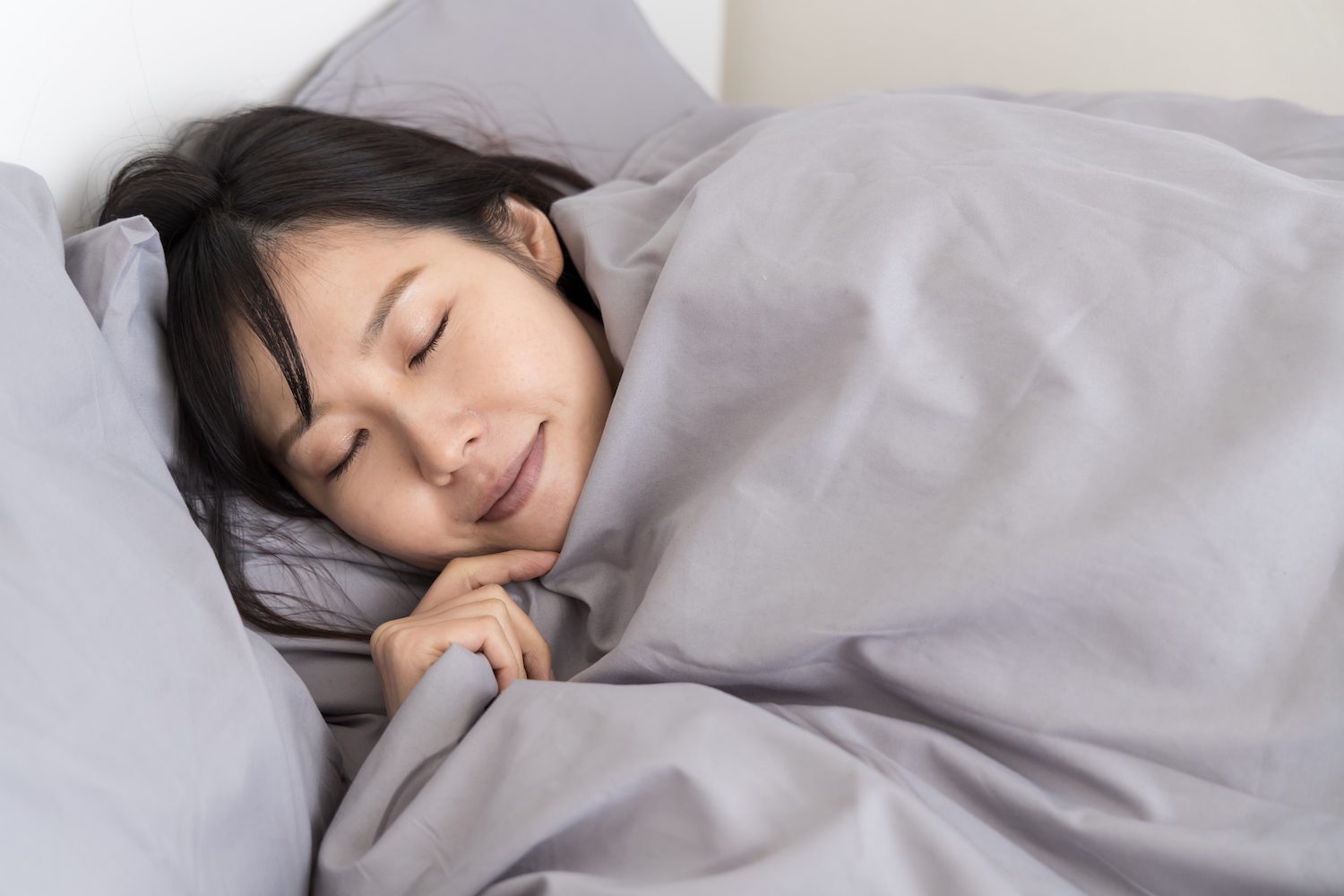Want to know how to get more restful sleep?
Deep sleep is vital to our health.
During the stages of REM sleep, the human body goes through important restorative sleep processes. This includes replenishing hormones, protein cells, and collagen.
When this sleep cycle is interrupted by sleep difficulties, it can have serious consequences on your physical and emotional well-being.
Do you suffer from chronic insomnia? Try changing your bedroom temperature or setting a regular sleep schedule. The results may surprise you.
Read on to learn about the nine tricks and tips you can try to get better, more restful sleep.
Wondering How to Get More Restful Sleep? Here’s How.
Doctors agree that it is best to get between 7–9 hours of sleep per night. This gives your body enough time for each sleep cycle.
But, the problem is that if your sleep isn’t restful, those hours in bed will do very little for your health.
Below are nine helpful sleep tips and tricks to help you get a full night’s rest.
#1 – Create a regular bedtime routine

Creating a regular bedtime routine is one of the most important steps towards good sleep hygiene.
A good bedtime routine should include relaxing techniques such as reading, drinking herbal tea, or meditation.
This routine should start at the same time each night — this includes during the week and weekends.
Science has shown that having a regular sleep schedule is helpful to keep your circadian rhythm on track. This means going to sleep and waking up at the same time each day.
Useful bedtime preparations:
- Wash your face with warm water
- Wear a sleep mask
- Stop using your electronic devices 2–3 hours before bedtime
- No snacks or drinks (especially caffeine and sodas) at least one hour before turning in
#2 – Adjust your bedroom temperature

The temperature of your sleep environment has a greater impact on sleep deprivation than noise or light.
Research suggests that sleep temperature is hardwired into our DNA. It is the reason humans and other mammals curl up to snooze.
A hot room will raise your heart rate, causing you to feel alert. However, shivering also keeps you alert, by stimulating your mind.
Sleep psychiatrist,Dr. Michelle Drerup, explains it this way:
“Typically it is suggested that the temperature in the bedroom for adults should be between 60 and 67 degrees Fahrenheit for optimal sleep. Your body temperature decreases as part of the sleep initiation process, and this range of temperature is thought to actually help facilitate this decrease.”
The perfect temperatures are cool enough to use medium-thick blankets head-to-toe.
Keep in mind, the months of the year will impact your methods for maintaining the best sleep environment.
To cool your room down:
- Install a fan
- Open your windows to allow air-flow
- Use cotton sheets
To warm your room up:
- Use flannel, fleece, or cotton sateen sheets to trap body heat (natural fibers work best
- Wear wool socks
- Use a humidifier
#3 – Reduce blue light exposure in the evening

Exposure to blue light from electronic devices tricks your brain into thinking it is daytime.
This reduces the production of melatonin, a key sleep hormone.
To negate the effects of backlit devices, sleep experts advise limiting phone, laptop, and television use two hours before bed. This helps prepare your mind for sleep.
If you must use your devices, wear special glasses designed to block blue light.
Android and iPhones now have apps available that block blue light after a certain hour. These apps should color your screen with a yellow or orange hue, which is more conducive to sleep.
#4 – Introduce regular exercise to your life

Daily exercise is good for your health and good for your bedtime.
In studies of patients suffering from lack of sleep, researchers found that regular exercise helped improve shuteye.
The time of day that you exercise will impact the amount of time it takes to fall asleep.
Intense physical activity should not be performed at least one hour before bed. This will increase your heart rate and blood pressure, keeping you too alert for rest.
If you prefer to workout at night, stick to moderate exercise.
After workouts, practice relaxation techniques such as stretching, yoga, or meditation.
A warm bath or shower after exercise is also a good way to relax your mind and body and prepare it for a full night’s rest.
#5 – Cut back on alcohol consumption

Alcohol negatively impacts your sleep for a variety of reasons.
Although alcohol is a depressant, it raises your heart rate and slows brain and muscle activity. This keeps your nervous system alert.
Overindulgence disrupts the production of nighttime melatonin and the human growth hormone (HGH). Both are vital to maintaining your circadian rhythm and stages of sleep.
As sleep psychologist, Hope Bastine, puts it:
“Alcohol can affect the body’s natural sleep architecture, meaning you might not fall into deep sleep.”
Studies prove that alcohol consumption can raise your risk of sleep apnea and heart disease.
To get more restful sleep, do not drink alcohol at least three hours before bed. You might want to cut back on the amount you drink too since liquor takes a long-time filter through your body.
#6 – Try bright light exposure therapy

Bright light exposure therapy is ideal for people who suffer from circadian disruption sleep disorders, such as problems falling or staying asleep.
Our circadian rhythm is the natural internal clock our body goes through every 24 hours. This process regulates when we are awake and when we want to sleep.
Frequent disruptions to this sleep cycle can have long-lasting effects such as obstructive sleep apnea, weight gain, and memory loss.
Exposure to natural bright lights helps control your circadian rhythm. Nighttime light exposure also plays a part, but this typically inhibits sleep.
Your body’s instinct to sleep can be disrupted by blue light electronic devices, cloudy weather, or poor sleep habits.
Bright light exposure therapy encourages exposure to light — specifically bright, natural light.
Sunlight is the best light to use with this therapy, but heat lamps and bright fluorescent lights work, too.
If using artificial lights, sleep experts advise getting at least six hours of light exposure for the best results: three hours when you wake up and three hours before bed.
#7 – Think about acceptance and commitment therapy
Acceptance and commitment therapy (ACT) is the practice of acknowledging your struggles to move past them.
This psychological practice is often used to help patients overcome feelings of stress, insecurity, and trauma.
Sleep specialist, Dr. Guy Meadows, says that ACT is the secret of how to get more restful sleep, helping those who suffer from chronic insomnia or fragmented sleep.
“ACT teaches people to lean toward the discomfort. It’s not the thoughts or feelings that are the problem, it’s our reaction to them. [W]e are caught in such a tug of war with them.”
To practice ACT, try accepting your insomnia the next time it happens. As you lie awake, instead of counting sleep, acknowledge the fact that you cannot get shuteye and that it’s frustrating.
This will relieve the tension you feel and, ideally, make way for restful sleep.
#8 – Give relaxation exercises a go

Relaxation techniques are a great way to help induce sleep.
If you are someone who suffers from poor sleep, your anxieties surrounding how you sleep may be playing a big role in your quality of sleep.
Relaxation techniques help combat this by soothing your mind at bedtime and giving you something else to focus on rather than stress.
Techniques include deep breathing exercises, mindfulness activities, and imagining peaceful, soothing environments.
The most effective relaxation techniques include progressive muscle relaxation, controlled breathing, body scan meditation, and guided imagery visualization.
Want to try some relaxation techniques? Read our article on how to practice the best relaxation techniques to sleep quicker and easier.
#9 – Try a herbal sleep remedy

Natural herbal remedies are popular sleep-promoting supplements for people suffering from poor sleep quality. You can typically find these ingredients in any grocery store.
Herbal remedies enhance sleep-inducing hormones that naturally occur in the human body.
If you wake-up frequently during the night, you are disturbing your REM sleep, which is the sleep stage responsible for the nighttime production of many hormones and proteins in the body.
If sleeplessness is disrupting the production of these bodily processes, it will become harder and harder to maintain a good night’s rest.
Herbal remedies help balance this insufficiency and restore your health to working order.
Top herbal remedies include:
Most herbal remedies should be taken within two hours of bedtime.
In Summary
Knowing how to get more restful sleep is key to ensuring you are working at your full capacity each day. How you sleep at night plays an important role in your physical, emotional, and mental health.
Sleep deprivation leaves you like a car with a flat tire and half a gas tank.
Relaxation techniques such as mindfulness and ACT will help you fall asleep faster and sleep soundly.
Regular exercise and monitoring your alcohol consumption will also go a long way to ensuring you receive proper shuteye.
Looking for more sleep solutions? Check out the other guides on our website for tips on getting a full night’s snooze.

Welcome to Snoozerville! I’m Dr. Alex Hartley, your guide to the world of restful sleep. With a Ph.D. in Sleep Science and years of experience as a sleep therapist, I’ve dedicated my life to understanding and improving sleep quality. My passion lies in uncovering the mysteries of sleep and sharing practical, science-backed advice to help you achieve the best rest possible. Beyond my academic pursuits, I’m an advocate for mindfulness and relaxation techniques, which I incorporate into my daily routine. At Snoozerville, I aim to transform your nights, combining the latest research with easy-to-implement tips. Whether you’re a chronic insomniac or just looking to improve your sleep hygiene, join me on this journey towards peaceful, rejuvenating sleep.

